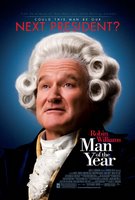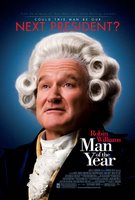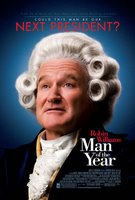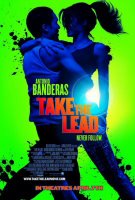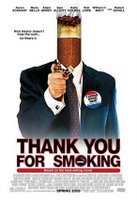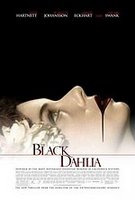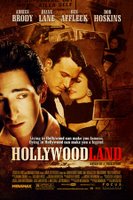I'll admit that I routinely pay for movies I know are going to be terrible while more thought-provoking and better-executed films are in theaters. That's probably reason enough to be stripped of my film degree, but if they let English majors keep theirs after reading
People magainze, I'm probably ok. So why do I do it? I, like many other movie-goers, love the spectacle of bad film; the sheer sense of, "We know it's bad, but how *unbelievably* bad is this one? How wildly ridiculous will one this get before we call foul?" It may not be responsible film-going, but it is good fun. Well, usually.
So before I ratchet up the pretension on this blog with some reviews of foreign films and indies laced with references to long-dead directors, I thought I'd confess my three biggest sins of the summer:
My Super Ex-Girlfriend,
Crank, and the ubiquitous
Snakes on a Plane. All three have their merits, and all three definitely have their faults. I promise to review them all fairly, but with a certain appreciation for how they might be enjoyed by a connisseur of cinema terrible. Also, as a bonus feature, I will point out the most glaring plot hole in all three. So let's get to it!
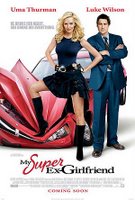
First off is director Ivan Reitman's latest,
My Super Ex-Girlfriend. Reitman, although responsible for some extremely memorable and endlessly enjoyable comedies early in his career (
Stripes,
Ghostbusters I & II,
Dave), seems to have lost his spark a bit and hasn't done much worth seeing in recent years. Sadly, this trend continues and Reitman becomes increasingly forgettable as a director with a lackluster recent résumé, including films such as
Father's Day,
Evolution, and now,
My Super Ex-Girlfriend.
This isn't to say
My Super Ex-Girlfriend is that bad of a film. Of the three films I'm reviewing, this one is easily the best in the sense of plot development, characterization, and pacing. The film moves along at a nice breezy clip, introducing us to Matt Sanders (Luke Wilson), a luckless shlub who seems to have finally found a nice, if slightly needy, girlfriend in Jenny Johnston (Uma Thurman). The twist is that Jenny is actually G Girl, who is apparently Earth's only superhero. This premise treats us to some fun visual gags of the amusing aspects of dating and breaking up with a woman who can't stopped by any force known to mankind. These diversions are definitely the most fun part of the movie, recalling Reitman's better films that were full of tossed off lines and gags. Rounding out the cast is Anna Faris, who also gets her fair share of super-harassment as Luke's new girlfriend, and Eddie Izzard as Professor Bedlam is the supervillian to G Girl's superheroics, despite the fact we never really see him do anything particularly villianous.
That ends up being the big sticking point that keeps
My Super Ex-Girlfriend from being a truly enjoyable regular comedy. The villian's not a villian, the hero's not a hero, the male lead isn't particularly engaging in any way, so the viewer is stuck wondering, "Well, who cares?" Eddie Izzard and Rainn Wilson of NBC's
The Office are both tragically underused comic foils, with Izzard being limited to only a few minutes of screen time and Wilson forced to deliver stock frat-boy lines about picking up girls, and how hot said girls are. Yawn.
I rate
My Super Ex-Girlfriend a one on the 22 scale, keeping in mind our multiplication basics about the number one. If you're in a good mood (a 12, say) and you see
My Super Ex-Girlfriend, you'll probably stay a 12. If you're a -12, I doubt it will cheer you. Either way, I wouldn't go too far out of your way to see it.
Biggest Plot Hole: The filmmakers suggest that Luke Wilson's cold fish of a character is the only man that hot blondes can date in New York City. Let's be real. He ain't that great a guy.
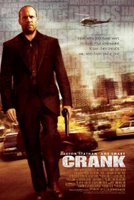
Next on the docket is the revved-up revenge film
Crank, featuring Jason Statham as the oddly named Chev Chelios whose seconds are numbered while he hunts for the gang boss who pumped him full of Chinese poison in a poorly explained double cross. Our hero Chev figures out early on in the tightly paced eighty minutes of
Crank that adrenaline combats the effects of the poison that is slowly taking over his body and mind. So, off he goes, trying to pull off every crazy stunt to keep his panic response going, no matter how dangerous or, in most cases, completely implausible said stunt is.
Let me get the bad out of the way first, as there are only two problems that keep me from wholeheartedly recommending
Crank. The first is that the main idea of the movie is utterly and completely unbelievable. This is not a dealbreaker, or even necessarily a negative thing, but the movie reaches ridiculous levels of suspension of disbelief within the first ten minutes. The other complaint I'll register vs. the defendants of the movie
Crank is that it is, for the most part, very misogynistic. The prime example is the scene in which our dear Chev tries to keep his adrenaline up in the middle of Chinatown by attempting to make love to his girlfriend Eve (played by Amy Smart, who deserves better), which comes amazingly close to becoming a sexual assault. Thankfully the movie avoids it, but it's only by technicality and I have to deduct points for it.
Those issues out of the way,
Crank is actually a lot of fun. The filmmakers get very inventive with their adrenaline boosting methods, from chugging Red Bull to shooting up epinephrine, and the camerawork is equally mobile. Statham's B-action movie pedigree from films like
The Transporter 1 & 2 and his unpretentious attitude keep things from getting too serious, as does the fine supporting cast. Dwight Yoakam, Efram Ramirez, and the aforementioned Smart all act as humorous bridges back to the real world whenever Statham's manic universe is getting too hectic. Rest assured, "hectic" is a loose description of how crazy the antics get in
Crank, but to spoil any of it would take away from the fun of the film.
Crank racks up a solid seven on the ol' 22 scale for sheer intensity and fun. Not much brain, but a lot of brawn, and its short running time and relentless pace lets you burn off all of your action movie cravings in one drug-like burst. If you have a beer or two beforehand, even better.
Biggest Plot Hole: Too much adrenaline can make your heart burst. The way Jason Statham goes at it in this movie, he should be dead in under 30 minutes from overexcitment. More accurately, he should last about five seconds, when he should get riddled by the ten-man gang that corners him at the beginning of the movie. But let's not pick nits.

Finally, we reach the most hyped film of the summer, or the year for that matter:
Snakes on a Plane. Now granted, I saw all of these films at varying states of intoxication, but
Snakes on a Plane I saw out and out wasted. Let me tell you: it. was. awesome.
(Click
here to see Your Racist Friend's take on
Snakes on a Plane.)
Forget the fact that putting a giant case of poisonous snakes on a plane is an absolutely terrible way to kill one specific person on said plane (a witness to a brutal killing of a DA by a mob boss, if you care about things like plot). Forget that you will recognize only Samuel L. Jackson and a handful of others in the cast of many (in fact, you may not recognize Juliana Marguiles, as she seems to have had some unforgiving work done). Forget that you have heard about this movie non-stop since January (and the many accompanying stories that led to its immediate cult status). The bottom line is the film delivers.
When I left the theater after seeing
Snakes on a Plane, I was at a loss to envision a snake-related death that did not actually already occur over the course of the film. So many incredible shock-tastic deaths pepper the first half hour of the movie, the viewer is left impressed with the breadth of ingenuity. This is a film that is not just giving shout outs to its internet fans; it acts as a out-and-out maitre'd to an exclusive bistro of thriller movie delights. And let's face it: that's why we came.
We paid to see anonymous actors flail around with snakes clamped on to their jugulars, screaming for help. We asked for a movie that offered little to no explanation for its ludicrous premise, other than the sheer visceral response that one has to the idea of cobras in the cockpit. We wanted to hear Sam Jackson tell us what, specifically, he had had it with. Lo and behold, they gave it to us. They gave it all to us.
Snakes on a Plane is so unabashed about its service to its fans that it is easy to overlook the fact that the tension peters out with about thirty minutes left in the movie. It's still plenty entertaining from that point on, but there is a sense that the snake-death toll isn't going to be spiking upward anymore.
Whether
Snakes on a Plane becomes one of our generations cult classics a la Rocky Horror Picture Show or
Plan 9 from Outer Space, only time will tell. But I'l say this much; it certainly deserves that status. It would be a shame to lose all of the great stories and anecdotes that have come from the hype of this film that built its legend over the months.
Snakes rates a twelve, making it definitely the best of this summer's worst. May it hold such a title forevermore.
Biggest Plot Hole: Seriously? How about the fact that a mob boss thought the most efficient way to kill someone would be putting SNAKES on a PLANE?!
-Mr. Me
 ***DISCLAIMER: This movie is not for the faint of heart, the overly sensitive, or the excessively innocent. Don’t get me wrong. These are not bad things to be; quite the opposite, actually. But if you are these things, be smart enough to avoid this movie. After all, it’s possible to be innocent without being naïve. Basically, there are two groups of people: people who are innocent, and people who can enjoy this movie.
***DISCLAIMER: This movie is not for the faint of heart, the overly sensitive, or the excessively innocent. Don’t get me wrong. These are not bad things to be; quite the opposite, actually. But if you are these things, be smart enough to avoid this movie. After all, it’s possible to be innocent without being naïve. Basically, there are two groups of people: people who are innocent, and people who can enjoy this movie.
